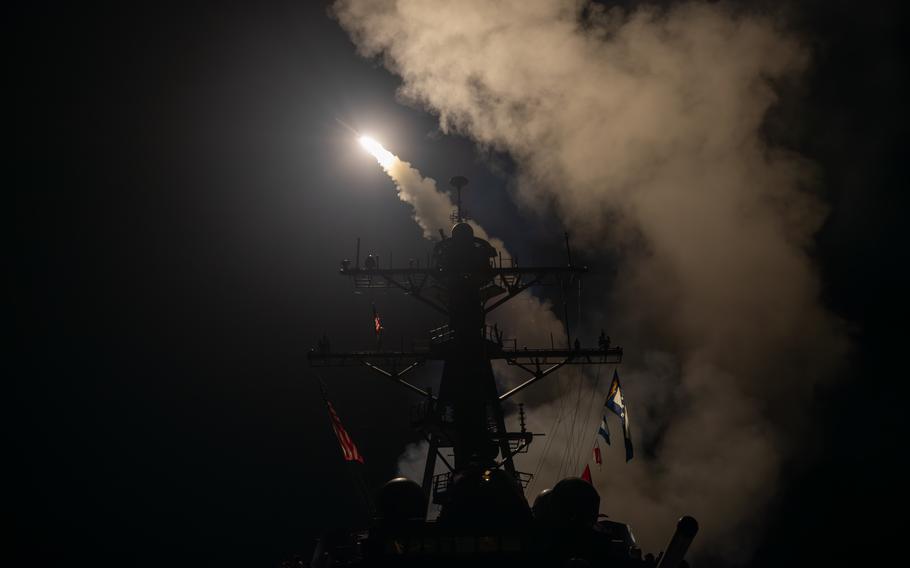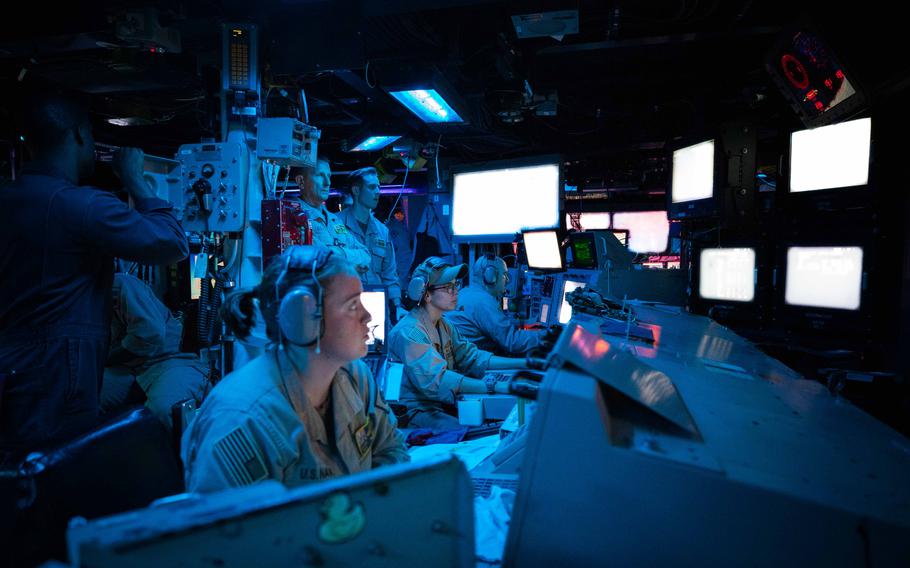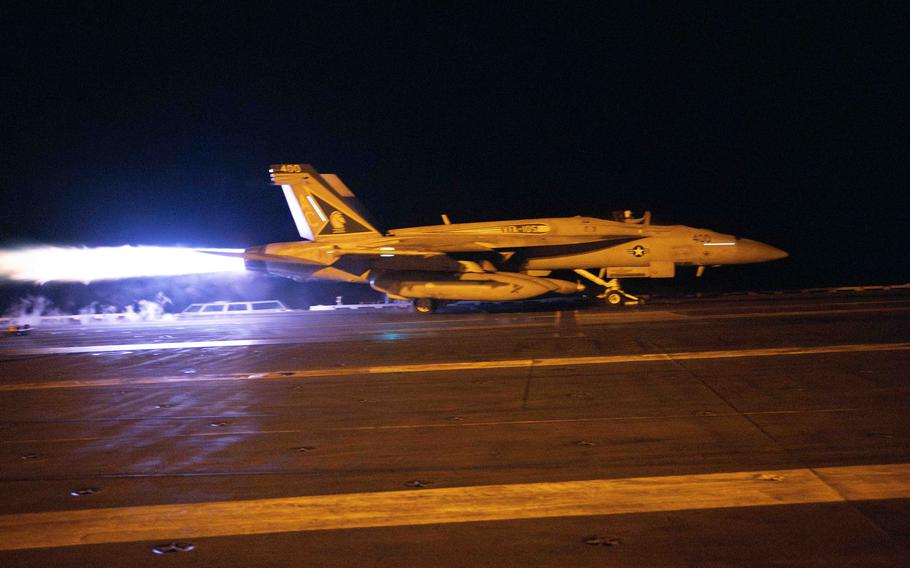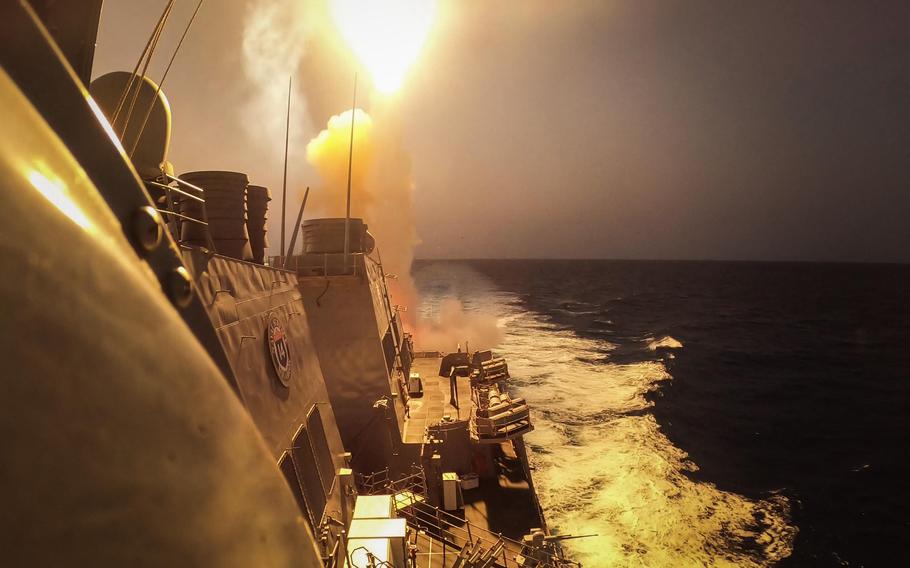
The destroyer USS Gravely launches Tomahawk missiles in response to a Houthi militant attack in the Red Sea on Jan. 12, 2024. The Navy has defended against nearly 400 drones and missiles since the group began its assault on commercial and military ships in the Red Sea more than a year ago, according to Vice Adm. Brendan McLane. (Jonathan Word/U.S. Navy)
NAPLES, Italy — The U.S. Navy has defended against nearly 400 attack drones and missiles in the Red Sea since Iranian-backed Houthi militants began their assault on commercial and military ships more than a year ago, a pace that has seen the service firing back at levels comparable to World War II battles.
Navy forces have fired more than 200 missiles against those attacks since the Houthis began their campaign in the strategic waterway in November 2023. Destroyers and cruisers also have fired more than 150 artillery rounds, said Vice Adm. Brendan McLane, commander of Naval Surface Forces.
Many of the munitions were fired in larger-scale battles, said McLane, speaking Tuesday during a panel discussion at the Surface Navy Association conference in Arlington, Va.
“We’ve done the analysis with what we used to shoot in World War II, and we’re at about two rounds per incoming missile to shoot (Houthi strikes) down,” he said.
That matches the current rates of fire to those of the historic battles fought more than 80 years ago, he added.

Sailors aboard the destroyer USS Carney stand watch in the ship’s Combat Information Center during an operation to defeat a combination of Houthi missiles and drones, in October 2023. (Aaron Lau/U.S. Navy)
In a recent attack, the destroyer USS Spruance was “in a fight where they shot down three anti-ship ballistic missiles, three anti-ship cruise missiles and seven one-way (aerial drones) that were coming towards” them, said McLane, who didn’t specify when Spruance was attacked.
On Nov. 11, Spruance and the destroyer USS Stockdale came under Houthi fire, fending off at least eight drones and eight missiles while transiting the Bab el Mandeb, a strait that connects the Red Sea to the Gulf of Aden.
Over the past 15 months, the Navy has fired 120 SM-2, 80 SM-6, and 20 Evolved Sea Sparrow and SM-3 missiles, as well as 160 rounds from its 5-inch guns. Those weapons defeated 380 Houthi attack drones and ballistic and cruise missiles, McLane said.
Those missile expenditures have cost the Navy hundreds of millions of dollars. SM-2 missiles are priced at about $2.1 million apiece while the SM-6 missiles cost about $3.9 million each. SM-3 missiles range from $9.6 million to $27.9 million, according to Missile Defense Advocacy Alliance data.
McLane acknowledged the expense, saying that modest threats increasingly were being addressed with lower-cost alternatives such as guns, electronic countermeasures and aircraft.
But commanders shouldn’t be considering the cost of a weapon when responding to a threat, McLane said speaking separately during a “status of the forces” address at the convention.
The Navy has sent 26 vessels into the Red Sea and nearby waters since November 2023, including the aircraft carriers USS Dwight D. Eisenhower and USS Harry S. Truman, to protect ships.

USS Dwight D. Eisenhower conducts flights in the Red Sea on Jan. 12, 2024, in response to Houthi militant attacks. (Zachary Elmore/U.S. Navy)
The Houthis have vowed to disrupt shipping until there is a cease-fire in Gaza. It wasn’t clear Thursday whether they would end their attacks should a ceasefire negotiated between Israel and Hamas, the warring parties in Gaza, begin Sunday.
Since Nov. 19, 2023, there have been at least 111 reported attacks, attempted attacks, hijackings and suspicious behavior incidents involving ships in the Red Sea.
Two vessels have been sunk, four mariners have been killed and two others were severely injured in attacks, according to Joint Maritime Information Center data. There have been no injuries or damage to Navy sailors or ships from Houthi actions.
But in an apparent “friendly fire” incident, the cruiser USS Gettysburg shot down an F/A-18 Super Hornet on Dec. 22 as the fighter jet was responding to a Houthi drone and missile attack on U.S. forces in the Red Sea. Both aviators aboard were rescued, with one suffering minor injuries.
Houthi tactics have evolved from the use of inexpensive drones and cruise missiles shot in irregular intervals to a “marked escalation in the scale and complexity of enemy techniques and capabilities,” McLane said.
Those advanced techniques include the use of anti-ship ballistic missiles and roving, one-way aerial attack drones in preassigned three-dimensional target areas, also known as kill boxes, he said.
That weapons engagement zone has taught sailors valuable lessons in the use of drones and directed energy weapons, such as high-energy lasers, McLane said.
“We’ve sped up our own learning and teaching so that our deploying ships are always prepared with the latest (tactics, techniques and procedures) before they go over the horizon,” he said.

The destroyer USS Carney engages Houthi missiles and drones in the Red Sea in October 2023. The Navy has defended against nearly 400 attack drones and missiles since the militant group began its assault on ships more than a year ago, Vice Adm. Brendan McLane said. (Aaron Lau/U.S. Navy)